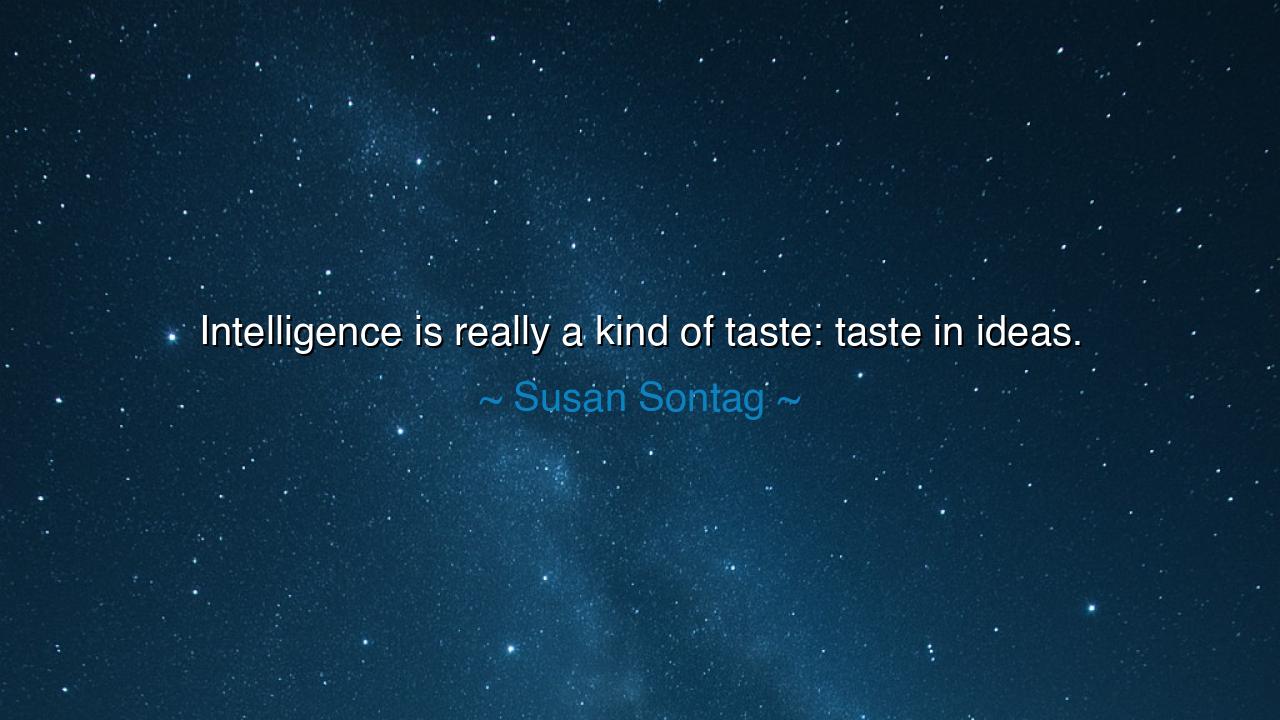
Intelligence is really a kind of taste: taste in ideas.






“Intelligence is really a kind of taste: taste in ideas.” So wrote Susan Sontag, the philosopher of modern thought and critic of complacent minds. In this brief and dazzling phrase, she reveals a truth both subtle and profound — that intelligence is not merely the accumulation of knowledge, nor the mastery of facts, but the cultivation of discernment. True intelligence, she teaches, is not what one knows, but what one chooses to dwell upon — which ideas one welcomes, which one questions, and which one discards as unworthy. Just as the artist refines his sense of beauty, so must the thinker refine his taste in ideas.
Sontag, who lived among artists, poets, and revolutionaries of thought, knew that the world is flooded with opinions, theories, and noise. In such a world, it is not intellect alone that distinguishes the wise from the foolish, but taste — the ability to recognize depth amid distraction, truth amid temptation. Many minds are brilliant but shallow; they dazzle with speed but lack direction. The intelligent mind, however, moves like a connoisseur through a gallery of ideas, choosing carefully what it admires and what it builds upon. To possess intelligence is to have an instinct for truth, a sensitivity to what nourishes the soul rather than flatters the ego.
This understanding is not new, though Sontag expressed it in a language fit for our time. The ancients too spoke of sophia, wisdom — not as the possession of facts, but as the harmony between judgment and beauty. The wise were those who saw beyond the surface of ideas to their essence, who could feel the elegance of truth as one feels the grace of music. To have taste in ideas is to see beauty in clarity, symmetry in reason, and courage in honesty. The philosopher, the artist, and the sage — all are united by this shared sense of taste, this refined intuition that guides them toward the eternal and away from the trivial.
Consider the story of Leonardo da Vinci, that universal genius whose notebooks overflowed with sketches, equations, and reflections. Leonardo’s greatness did not spring merely from intelligence, but from discernment — from his exquisite sense of which questions mattered. He did not waste his curiosity on gossip or imitation, but directed it toward the mysteries of life, light, and form. He had, as Sontag would say, a taste for ideas that nourished both the mind and the spirit. His intelligence was not a torrent, but a stream flowing always toward meaning. In him we see that intellect guided by taste becomes not chaos, but creation.
Sontag’s insight also warns against the arrogance of mere cleverness. The world is full of minds quick to argue and slow to understand. Such people are like those who gorge themselves at a banquet of words, unable to distinguish nourishment from indulgence. The intelligent mind, by contrast, has restraint — it chooses ideas as one chooses companions: with care, respect, and intuition. It is not the abundance of thoughts that makes a person wise, but the quality of those he allows to shape his life. The refined thinker is not one who knows everything, but one who knows what is worth knowing.
To cultivate such taste requires both humility and courage. Humility, to admit that not all ideas are equal — that some are poisonous, others shallow, and a few divine. Courage, to reject the fashionable and pursue the timeless. The thinker of true intelligence must walk a lonely path, turning away from the easy comfort of popular thought to seek the hard beauty of truth. Such discernment cannot be taught by books alone; it must be earned through solitude, reflection, and dialogue with the great minds of history. For taste in ideas grows as the palate of the soul matures — it ripens through experience, contemplation, and the patient labor of the heart.
So, dear seeker of wisdom, let this teaching be your guide: train your mind as you would train your eye or your ear. Seek the beauty of clear thought, the elegance of reason, and the power of truth spoken simply. Do not consume ideas as though they were sweets, but savor them as one savors fine wine — discerning what uplifts the spirit and what dulls it. Read deeply, listen widely, and think slowly. Let your mind become a sanctuary for ideas that ennoble and enlighten, not a market for noise and vanity.
For in the end, as Sontag reminds us, intelligence is really a kind of taste — the art of knowing what deserves our attention and what does not. Cultivate that art, and your thoughts will become not a tangle of borrowed words, but a symphony of understanding. Then you will live not merely as a thinker, but as a lover of truth, whose mind, like a fine instrument, resonates only with what is noble, beautiful, and eternal.






AAdministratorAdministrator
Welcome, honored guests. Please leave a comment, we will respond soon